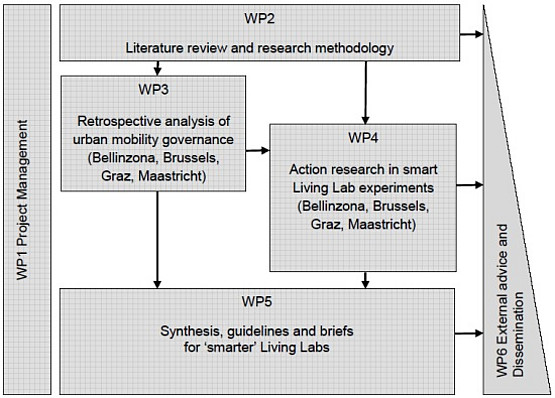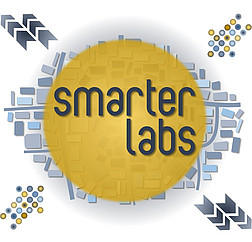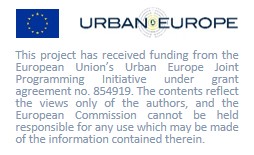Project design

The SmarterLabs work programme is designed to develop a Smart City Living Lab approach in a stepwise manner, with each step yielding concrete deliverables as well.
In the first step (WP2), a literature review is conducted of Smart City Living Lab experiences as well as socio-technical barriers and issues of social exclusion encountered in large-scale implementation of smart city technologies, with a focus on smart urban technologies for transport and mobility. This literature review informs the development of the methodological framework and specific research questions for the retrospective analysis of urban mobility governance and for the action research in Living Lab experiments in implementation projects in smart urban mobility in the four cities. The research partners of the consortium have complementary analytical and technological expertise and are therefore all actively involved in this effort.
The following two steps (WP3 and WP4) are conducted with a small overlap. The retrospective analysis of urban mobility governance (WP3) addresses past projects and interventions in the four cities. These studies are conducted by the university partners, all being familiar with the local situation and having good access to the relevant data sources. A comparative evaluation of the cases from the retrospective analysis is used to guide the action research.
Action research in Living Lab experiments with smart mobility solutions (WP4) is conducted in Bellinzona, Brussels, Graz and Maastricht. In all four cities, specific implementation projects for the Living Lab experiments have been identified and the main organizations responsible for implementation are part of the consortium.
The fourth step (WP5) involves a synthesis of the findings from the retrospective analysis and the action research in Living Lab experiments, development of an implementation guide for improved Smart City Living Labs, and a policy and practitioners brief. The focus in this step is on a comparative evaluation of the four cases to identify common and recurring risks to implementation of smart mobility solutions and effective ways of addressing these risks in a smart governance approach.
To enhance the transferability and applicability of the guidelines and thus stimulate their successful dissemination, workshops are organized (as part of WP6) in the three cities of our Advisory and Dissemination Board members (Helsinki, Santander, Istanbul). In these meetings, the results of the LL experiments in terms of implementation guidelines are tested in different city contexts and refined, based on advice of stakeholders.


